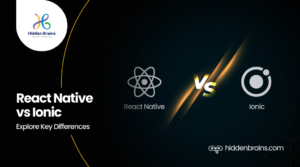Summary
The blog compares React Native and Ionic as top cross-platform mobile app frameworks in 2025, helping stakeholders choose based on performance, UI/UX, development speed, and cost. React Native excels in native-like performance and complex apps, while Ionic offers rapid development with a single codebase using web technologies. It highlights pros, cons, and use cases for both, guiding enterprises on which framework fits their project needs.
Want to create a secure, scalable and feature-packed cross-platform mobile application but confused about choosing one from React Native vs. Ionic? Due to the availability of a vast landscape of technologies surrounding the mobile app development process, making the right choice can take time and effort.
As per a recent survey, React Native has a popularity of 9.14%, and Ionic has 3.33% among professional developers. However, both of these are in demand for accomplishing the projects, including cross-platform compatibility and more functionalities.
A head-to-head comparison between these trending frameworks will help fulfill your project needs. The key metrics for differentiation will be performance, development speed, cost and more parameters.
Table of Contents
To begin with, here is a video that could provide basic knowledge about using Ionic vs. React Native for the your next project.
The video extensively shares critical information for React Native vs. Ionic, along with Xamarin. The viewers will receive details based on various attributes and particulars that are mentioned in the video. The summary from the link is to make stakeholders aware of the frameworks and their efficient use.
For modern app development, the stakeholders of a project must be aware of React Native vs. Ionic. Check out all the sections of the blog to understand which one to choose from these top frameworks.
What is React Native Vs. Ionic?
React Native and Ionic are both popular frameworks for mobile app development. React Native allows developers to build high-performance, native-like apps using JavaScript and React, focusing on smooth user experiences. Ionic, built on web technologies like HTML and CSS, wraps web apps in a native shell, making it ideal for faster development and cross-platform compatibility, though it may not offer the same native performance as React Native.
About React Native
Are you planning to build an impactful iOS or Android mobile application with React Native? Well, the framework is effective in streamlining development to accomplish specific user requirements. The important aspect to know is that JavaScript and React are used to create cross-platform apps with the help of native components. These ensure user responsiveness and help to build an engaging interface.
Choosing React Native is not only a scalable solution for enterprises but also a support to the developers because of its robust ecosystem of development tools. This indicates that the enterprise can leverage cutting-edge technologies while managing time and cost efficiency according to market trends.

Get React native app development services from Hidden Brains to build scalable mobile applications.
About Ionic
If building a high-performance mobile app is the need of the hour, then choose Ionic! Ionic has a market value of 3.72%, meaning that it has a good reputation for developing mobile applications. Also, such applications are compatible with cross-platform development and have a better user reach.
This framework is versatile and can be integrated with frameworks like Angular, React, and Vue to build scalable and flexible applications. Businesses like yours should provide a personalized user experience or improve mobile app development. In both scenarios, Ionic is the right choice.
This is a brief description of Ionic and React Native, but the crucial part remains, which is the key differences. Explore the 2025 comparison from the blog by continuing to read the blog sections.
Pros and Cons of React Native:
| Pros | Cons |
|---|---|
| The shared codebase allows enterprises to save many costs | The usage of JavaScript and Native code creates debugging challenges |
| The developers have third-party plugin support to include multiple functionalities | The limitation is that full customization is not possible as some native features are not available |
| The coding modifications can be done in real time for rapid application development | The framework has native module dependency that increases code complexities |
| React Native can be chosen by the project stakeholders of large enterprises to build cross-platform applications | There is a challenge to utilize the framework for building complex applications |
| JSX can be used to create better UI | Certain UI components might not perform well which creates a challenge |
Pros and Cons of Ionic:
| Pros | Cons |
|---|---|
| A single codebase can be used for building web, Android and iOS applications | Performance can be affected when including complex animations |
| The rich library of pre-designed UI components is available to provide a native look to the app | Ionic requires familiarity with Angular, React or Vue |
| The enterprises that want to build a prototype to represent the software product to the clients then Ionic is the perfect | The limitation is the app size and including certain features/functions |
| Project stakeholders can select Ionic for building Progressive Web Apps | Customization to the PWA might require additional plugins |
| Cloud integration is convenient in that could add a competitive advantage to large enterprises | The development of complex mobile apps is time-consuming |
Each of these backend frameworks has advantages or limitations. However, enterprises need to select one to accomplish the next project. To help you gain support for your decision, we have shared fewer comparison points.
React Native vs. Ionic: Key Differences Enterprises Must Know
React Native vs. Ionic comparison brings out compelling advantages of each tailoring to discrete project needs. The differentiation according to key factors will help enterprises to create better mobile app development strategies and to make informed decisions. Let’s explore the differences to select the best for the new project.

React Native Comprehensive Comparison of Key Features and Considerations
1.Technology Used:
Every mobile application is built with certain technology that supports its overall functionality. JavaScript and React are used to make fast and responsive applications in React Native.
2. UI/UX:
Native components are used to create a user-friendly look for the applications. This allows users to interact with the app easily. The enterprises might be wondering to include the essential components that could hold back the visitors for a long duration of time.
3. Performance:
Due to the cross-platform capabilities, applications are developed faster. However, additional knowledge of native development is required to add advanced features. If enterprises are searching for a complete package of features and functionalities, then Ionic vs. React Native—with React Native being favorable—offers less time-consuming development.
4. Cost:
The enterprise owners or the project stakeholders must be aware of the pricing model. The predictable cost of React native app development ranges from $30,000 to $300,000. We are sharing a general idea for the same because the potential cost differs depending on various factors, such as project requirements. To know the costs, the enterprises have to be clear about aspects such as the company’s budget, functionalities required in the application and app complexity.
5. Scalability:
Since the developers can make use of a single codebase to create cross-platform applications, it promotes flexibility. Also, React Native’s architecture is designed to handle the development of complex applications that ensure scalability. The enterprise can select this framework for upcoming projects because of this feature.
6. Future Considerations:
For enterprises that have a huge clientele with specific requirements for building secure and fast applications, then react native is a good choice. The framework is capable of handling databases and other aspects of the back end. In the future, the framework can be considered to build scalable web applications.
Ionic Comprehensive Comparison of Key Features and Considerations
While comparing React Native vs. Ionic 2025, the key consideration can be rapid mobile app development, which is sometimes in demand by enterprises. Ionic is one of the supreme frameworks that allow companies to build cross-platform applications. These days, clients are required to access the applications on various devices and operating systems. To have a better reach, enterprises have to think out of the box solutions. Here is a description of Ionic to help you find the relevant comparison points.
1. Technology:
Unlike React Native, Ionic is also supported by various technologies such as HTML, CSS, and JavaScript. These are the markup languages that support the basic functionality of the application. Enterprises that are wondering about building mobile applications based on ionic must be aware of this technical aspect.
2. UI/UX:
There are certain limitations to designing user interfaces for Ionic applications compared to React Native. Ionic has reusable components that developers utilize, and aesthetic design can be created for ionic applications with amazing UI/UX features.
3. Development Speed:
Ionic comprises an extensive component library that allows rapid software development. Hire mobile app developers to build the best applications with React Native and Ionic. Since enterprises would prefer to add certain functionalities to the application, there is a chance that the development speed may vary depending on the framework chosen, such as Ionic vs. React Native.
4. Cost:
Before adding multiple features to the application, the project stakeholders might be excited to know the price. The monthly rate in the United States is around $9,800, but this is not a well-determined cost. The project managers have to specify the expenses according to the specific client requirements. Well, this is not a fixed price because of various factors. The final cost is decided according to the preliminary requirements.
5. Scalability:
The developers need not modify the core code, which allows them to make relevant changes according to the customer or market demands. Also, the cross-platform app development architecture allows the developers to add the required features even after the software product is deployed.
6. Future Considerations:
Enterprises can consider ionic for mobile app development in the future. The key consideration can be the cost-effectiveness and robustness of the model that it offers. Besides this, a wide range of features & functionalities can be added to the application.
While discussing the Ionic vs. React Native differences, the project managers make the final decision to select one among the two frameworks. The important thing to note is that the companies that want to hire Ionic App Developers must be clear about the skills required in the personnel.
Similarly, suppose the businesses want to hire React native app developers. In that case, the candidate should know libraries and, specifically, the offline functionality. If there is any doubt, then you read the use cases that will support your opinion in selecting the right expert for the upcoming projects.
Also Read: Ionic vs. Flutter: Which One Works for you
Use Cases: React Native vs. Ionic in 2025
The purpose of sharing the Use Cases of React Native and Ionic is to help users and enterprises understand the functionality. Before that, we would like to share the popularity of React Native vs. Ionic.
View the graph above. This data is shared by Statista, which shows that 42% is the ideal usage of React Native, and 28% is Ionic. Enterprises must give first preference to the React Native framework for mobile app development. Moreover, the project stakeholders can check out the use cases from the next section to make a crucial decision.
Use Cases of React Native:
The core features of React Native, which are performance and flexibility, make it an ideal choice for enterprises to use for the next project. Where can this framework be utilized? Check its use cases in comparison to Ionic vs. React Native:
1. For Prototyping:
The minimal viable products can be rapidly built for the companies that are mid-sized or large enterprises. The dedicated development team can create a prototype before accomplishing the full-scale development.
2. To Build Apps Subjected to Including Complex UI/UX Features:
Large enterprises seek developers who can build complex applications that include the required features. React Native allows developers to add the features that are of utmost importance.
3. To Build Any Mobile App:
This is to understand that the user’s requirements are not stable. Enterprises might receive a request to build applications such as social networking, finance, travel, e-commerce, media, enterprise applications, and education.
The purpose of discussing these use cases is to provide knowledge to the enterprise owners and the project managers that the experts of Hidden Brains are there to assist you promptly.


Contact us to Hire React Native App Developers.
Use Cases of Ionic:
The framework can be used to build desktop, mobile, or web applications with as many features as required. Enterprises can choose Ionic for rapid mobile application development. The prominent feature is that this framework can be used to develop complex mobile applications. Let us explore the uses of Ionic to understand it better, especially when compared with Ionic vs. React Native.
1. To Build Progressive Web Apps:
PWA is trending these days, allowing businesses to deliver an accurate branding message. Users can access the mobile application just as they use it in a web browser. The functionality can be added according to the business requirements.
Also Read: Everything you want to know about React Native Development.
2. Cross-Platform Mobile App Development:
Enterprises can choose the Ionic App Development Service for building applications that can run on any device and can work on any operating system. Users appreciate such users and have access to run them on any operating system.
3. To Test the Mobile Applications:
The developers are required to test the mobile app for iOS or Android once the development is completed. The Cordova command is used to ensure that the application is free from bugs before deploying it to the client’s space.
Use cases of ionic also depend on the business requirements. We have shared fewer here for your reference. The best thing would be to share the app specifics with our professionals. They will assist you in building a supreme-quality software application.
Conclusion
This is to conclude from this detailed blog that React Native vs. Ionic frameworks are suitable for mobile app development. The cross-platform development capabilities of react native make it an appropriate framework for modern mobile application development. On the other hand, if an enterprise needs to build mobile applications with various UI elements, then it must prefer Ionic. In summary, the budget, client requirements, and the skills of the developers are the key factors that allow the companies to choose a particular framework.
How Can Hidden Brains Help Select the Best Mobile App Framework?
During peak times when the project has strict deadlines, the enterprise owners and project managers have to quickly come up with a decision on which framework to select. In such a critical situation, Hidden Brains comes out as a helping hand whose experts are determined to provide reliable solutions.
The enterprises can connect to our firm by simply sharing an email with us at biz@hiddenbrains.com. Our specialists are available to provide the best consultation that is effective for your business success. We have relevant experience in software development and outsourcing and work with a huge client base so that you can rely on us. Our experts will assist you in selecting the best mobile app framework, whether it’s Ionic vs. React Native, to help you accomplish your next project with ease.
Frequently Asked Questions
Believing that the blog has shared the necessary information with you regarding Ionic vs. React Native. Here are some FAQs that would be of help to you.
Which Framework is Likely to Observe Growth in the Future?
Comparatively, Ionic vs. React Native has a significant future because of React Native’s wide community support and many other features. In the blog, we have shared the market value of React Native, which is comparatively higher than Ionic. Though Ionic is supreme for rapid app development, enterprises usually select React Native only. In terms of future considerations, both of the frameworks can be utilized depending on the type of project that needs to be accomplished.
React Native vs. Ionic: Which Framework is Cost-Effective for Development?
To be precise, React Native is expensive, but it is effective in accomplishing projects in the long run. However, the benefit is that only additional maintenance is required to make the changes in the native platforms and not in the whole application. On the contrary, Ionic work with a single code base promotes rapid development with lowered development and maintenance costs.
Ionic vs. React Native: Which Framework is Better for Complex Applications?
The use of react native components makes React Native favorable for building complex mobile applications. Responsive user interfaces are a primary requirement of the users, which is why React Native is ideally suited for creating complex mobile applications compared to Ionic.
Ionic vs. React Native: Which Framework is Better for Offline Functionality?
AsyncStorage, Realm, or SQLite are some of the libraries that are used in React Native to integrate offline functionality. Also, advanced state management solutions such as MobX can be used to sync data. On the other hand, ionic is not that much preferred. However, IndexedDB, localStorage, and SQLite still lack in offering great performance in terms of offline functionality.
React Native vs. Ionic: Which Framework Offers Better Performance?
React Native generally delivers better performance because it uses native components and APIs, making it suitable for apps requiring smooth animations and faster load times. Ionic relies on WebView, which works well for simpler apps but may show performance limitations in highly interactive or graphics-heavy applications.
Conclusion
This is to conclude from this detailed blog that React Native vs. Ionic frameworks are suitable for mobile app development. The cross-platform development capabilities of react native make it an appropriate framework for modern mobile application development solutions. On the other hand, if an enterprise needs to build mobile applications with various UI elements, then it must prefer Ionic. In summary, the budget, client requirements, and the skills of the developers are the key factors that allow the companies to choose a particular framework.































































































![Sales & Distribution [Oil & Gas] Sales & Distribution [Oil & Gas]](https://www.hiddenbrains.com/blog/wp-content/themes/blankslate/assets/images/sales_and_distribution-icon.74d08193.svg)

![Fluid Terminal Management [Oil & Gas] Fluid Terminal Management [Oil & Gas]](https://www.hiddenbrains.com/blog/wp-content/themes/blankslate/assets/images/fluid_terminal_management-icon.4b3a27a4.svg)































![Sales & Distribution [Oil & Gas] Sales & Distribution [Oil & Gas]](https://www.hiddenbrains.com/blog/wp-content/themes/blankslate/assets/images/sales_and_distribution-icon.74d08193.svg?1.0.0)
![Fluid Terminal Management [Oil & Gas] Fluid Terminal Management [Oil & Gas]](https://www.hiddenbrains.com/blog/wp-content/themes/blankslate/assets/images/fluid_terminal_management-icon.4b3a27a4.svg?1.0.0)
























































































































































































